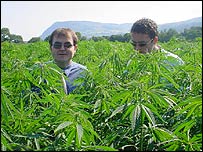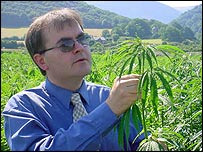Most motorists zooming along the A55 past Bangor on the north Wales coast have little idea that there is a full field of cannabis plants thriving only 200 yards away.
But there is no danger of this crop getting anyone high.
It is being grown by scientists from Bangor University who hope the versatile plant will breathe new life into the farming industry in north west Wales.
The project, which is being caried out on the University’s farm in Abergwyngregyn and is funded by European Objective One money, aims to assist farmers to diversify by growing alternative crops like hemp and flax.
 Industrial hemp is the same species as the cannabis plant that produces the drug marijuana but has virtually no intoxicating effect.
Industrial hemp is the same species as the cannabis plant that produces the drug marijuana but has virtually no intoxicating effect.
Its use goes back many years and was traditionally used to make ropes because of its strong fibres.
Nowadays, hemp and flax still have many uses – they are used to make clothes, building materials, food, detergent, fuel and cosmetics.
Mercedes
Project manager, Geraint Hughes, says he hopes their trials could lead to the development of an industry that produces insulation material, gardening products such as hanging basket lining and a substitute for fibre glass.
Hemp is used, for example, in the door panels of the Mercedes Class A car.
Mr Hughes says the crop has many advantages.
“It is a very green plant, it is carbon neutral and biodegradable – it is much more environmentally friendly than cotton for example, which needs a lot of spraying with pesticides.”
This is the second year of trials at the University’s farm and they say that about eight other farms in north west Wales now grow the crop.
But there is nothing new about Welsh farmers growing cannabis says Mr Hughes.
“Harlech was the hemp capital of the UK in the 1800s.
“It used to be a legislative requirement for farmers to grow hemp to make ropes to supply the navy.
“That is why many place names in Wales are based on the Welsh word for hemp – “cywarch” – such as Cwm Cywarch near Dinas Mawddwy.
“And also the Welsh word for flax – “llin” – is seen in the place name Cwm Lline and the Welsh word for twine is “llinyn”,” he added.
Drug content
The crop is being grown under strict Home Office legislation and does not have the “drug” component.
 “You would have to eat the whole crop for it to have any effect on you,” says crop scientist, Dr Jim Dimmock.
“You would have to eat the whole crop for it to have any effect on you,” says crop scientist, Dr Jim Dimmock.
“But you’d probably die in the process if you tried!
“There are certain rules you must adhere to – you have to prove which variety the plant is.
“If it is over the drug content threshold, the Home Office can destroy the whole crop,” he added.
“The idea is to give farmers a viable alternative enterprise in the region and create a local industry.”
With the downturn in livestock prices after the foot-and-mouth crisis, the project hopes that their trials will help find the perfect varieties and conditions for growing hemp in the region.
© BBC MMIII 2003
Source
BBC NEWS vom 2003-07-14.
Share
Renewable Carbon News – Daily Newsletter
Subscribe to our daily email newsletter – the world's leading newsletter on renewable materials and chemicals









